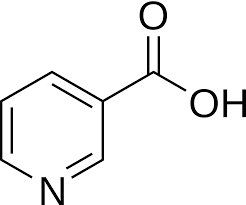HI! I’M ELEMENT AI.
Niacin

Product Description
Niacin, also known as vitamin B3 or nicotinic acid, has various industrial and health-related applications.
Product:
Niacin
CAS:
59-67-6
Synonym:
Nicotinic acid; vitamin B; Pyridine-3-carboxylic acid3
Structure:

Typical Characteristics
Appearance
White crystalline powder
Density
1.473 g/cm3
Melting point
237 °C
Molecular Weight
123.11
Odor
Odorless
Purity
≥99.5%
Uses, Applications & Markets
Key applications
get a quote



Niacin used in many
industry applications
Niacin, also known as vitamin B3 or nicotinic acid, has various industrial and health-related applications. Here are some of its notable industrial uses:
- Food Fortification: Niacin is widely used to fortify foods in order to prevent niacin deficiency and related conditions, such as pellagra. Common fortified foods include flours, cereals, and bread.
- Pharmaceuticals: In the pharmaceutical industry, niacin is used in the formulation of dietary supplements and medications aimed at treating high cholesterol and niacin deficiency. It's known for its ability to lower LDL (bad) cholesterol and triglycerides while raising HDL (good) cholesterol.
- Personal Care Products: Niacinamide, a derivative of niacin, is utilized in skin care products for its anti-inflammatory, antioxidant, and skin barrier-strengthening properties. It's found in creams, lotions, and serums aimed at improving skin health.
- Animal Nutrition: Niacin is added to animal feed to promote healthy growth and metabolism in livestock and poultry. It is essential for optimizing energy production and reproduction in animals.
- Functional Foods and Beverages: Niacin is incorporated into functional foods and beverages aimed at delivering specific health benefits, such as energy drinks that target mental alertness and metabolism.
- Cosmetic Applications: Besides skin care, niacinamide is also used in cosmetic products for its ability to reduce the appearance of aging, such as fine lines and wrinkles, and to improve the overall texture of the skin.
- Medical Research: Niacin continues to be a subject of medical research for its potential benefits in preventing or treating a range of conditions, including cardiovascular diseases, diabetes, and neurodegenerative disorders.